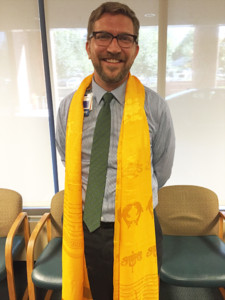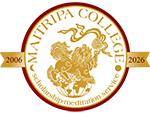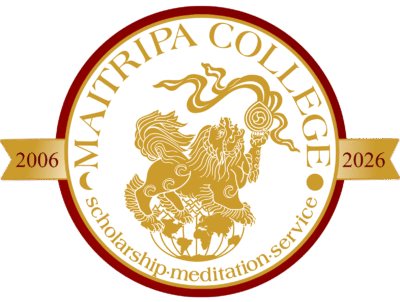
News Update (August 17, 2016)
Maitripa MDiv Alumnus Carl Jensen completed his Clinical Pastoral Education (CPE) Training at Providence Hospital, and is now “Chaplain Carl”! He and his classmates were honored in a Service of Blessing and Farewell on August 17, 2016, at Providence Hospital in Portland.
An Interview with Carl Jensen, Buddhist Chaplain
Alumni Carl Jensen (2015) was accepted pre-graduation into a competitive year-long clinical internship at Providence Medical Center in Portland. The internship, called Clinical Pastoral Education (CPE), is a professional requisite to becoming a Board certified chaplain, much like a residency for a physician.
As Carl’s year-long program concluded, he was offered a job as a full-time chaplain at Providence Medical Center! He sat down with us to share about his experience, his preparedness for the program, and the growing pains of becoming a professional chaplain.
What have been your favorite parts of your CPE program?
I have been developing the skills to have a greater level of openness and intimacy with other people, especially the patients that I work with. This has come about the hard way, through the CPE process, which includes a lot of looking and reflecting on our encounters, mostly with patients, sometimes with staff. I am challenged to figure out what comes up for me, including reactive patterns, and doing it over and over and trying to apply what I learned. Having peers, the other residents in the program, has been incredibly helpful. I can be really open with them and feel and be held in that experience. I am the only non-Christian on staff out of a dozen residents, and it has been an incredibly supportive experience.
Sounds kind of like a sangha?
It’s a community in that sense for sure. Without necessarily the shared theology.
What have been the trickiest/ most challenging aspects of the program?
Learning to work with patients and families who need spiritual support, but they have some pretty defined limits that they are looking for. You often get a sense that people are trying to figure out your religious background, and they can have some pretty specific expectations.
How do you navigate that?
I tell them I’m an interfaith chaplain, and I try to leave it at that. But with the right people, I can share my Buddhist background.
To some people, I’m Pastor Carl, a Presbyterian; I say a lot of Christian prayers with people. It’s a very powerful thing to pray with people, even if it’s not particularly my tradition. The prayers I offer are more of a broad understanding of the Divine, understanding that I also hold, so it feels incredibly natural to support people in that way.
The best thing for me is when I’m on my floor, and I start to get a sense of the “feel” of the floor, of what’s going on. You can really feel yourself drawn to certain rooms or patients; for whatever reason, you’re moved to be there. My boss says, “God will put you where you need to be,” and I believe in that with a Buddhist sentiment. You can tell that you have karma with some people.
Did you think you were prepared for this?
I did think so, but I wasn’t totally prepared. Having a meditation practice is really helpful. The ability to be mindful and observe what’s going on within ourselves is so important; that can often help me shed light on what’s going on for the patient as well. Dan Rubin’s classes were huge (THL310: Pastoral Care and Counseling) for providing a framework for empathetic listening, and LaShelle Lowe-Charde’s courses in Non-Violent Communication We talk a lot about what we feel in the CPE program, and that’s where the substance is.
Can you share an experience where your Buddhist training really came in handy?
There is stuff that we Buddhists do well, and I think one of those things is being around suffering. We have a theology that has a place for suffering, and we don’t need to just look at the bright side. For example, we wouldn’t say something like “God will never give you things that you can’t handle,” which is something that can be very unhelpful. We can stay engaged with suffering and not run away from it. On the floor where I am assigned, there is a lot of suffering and worry.
For me, a big struggle was, “Am I going to be the most depressing chaplain ever?” Rather than cheering someone up, am I going to just stay with the darkness?
Has that come true, are you?
No, I worried about that, but it doesn’t happen. I’m not the most depressing chaplain ever (laughs).
What actually happens?
I provide a space for people to be held, so that they do the work themselves. I find that patients that I have a relationship with, whom I visit several times, they end up doing the work between our visits.
What can Maitripa College(MC) do better to support students going into CPE placements?
I think that a big part would be having a more robust interfaith approach. There are very, very few Western Buddhists who come into the hospital. The vast majority of Buddhists in the hospital come from an ethnic or cultural Buddhist group, so that’s a challenge. The vast majority of people you’ll be working with are from a Christian background or with no religious affiliation. As Buddhists, we have kind of a halo around us with the people who have no religious affiliation. Many people have a lot of wounding in the past with Christianity, and we (Buddhists) can have a deep conversation without using the word God. This is a population we can really reach out to and be of benefit for.
I’ve had to learn to speak in a broad vocabulary, and develop dialogue and conversation with members of other faith traditions that focuses on commonalities, not differences. You can get to a place that transcends religion and gets to a very human level.
Any advice to current and future MC students pursuing chaplaincy?
Take Dan Rubin’s classes. Having that background is really valuable. Generally, if a person wants to get in, you need to show these human skills; interpersonal especially. You also need to be grounded in a theology that the core here provides.
Anyone that you’d like to say hello to?
Ven. Tenku Ruff (MDiv. 2015). Around the time she was in her CPE, and also studying at Maitripa College, I learned a lot from her while she was going through that process. Whenever people would get too in their heads, she would say, “How does this relate to practice?” She always brought it back to the lived experience. That was excellent advice.


